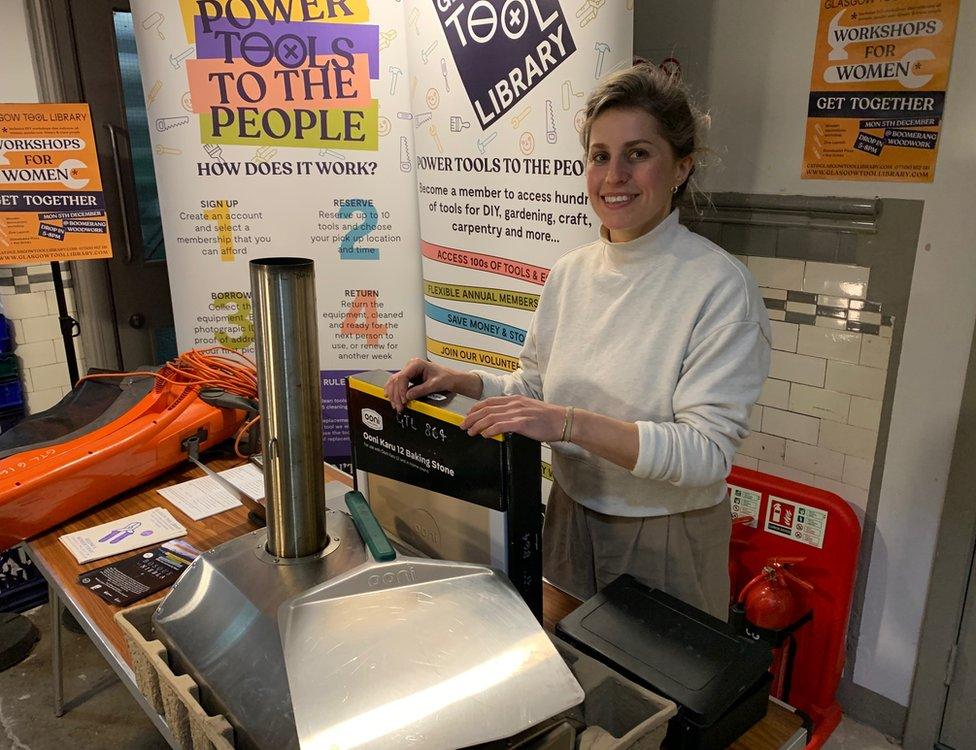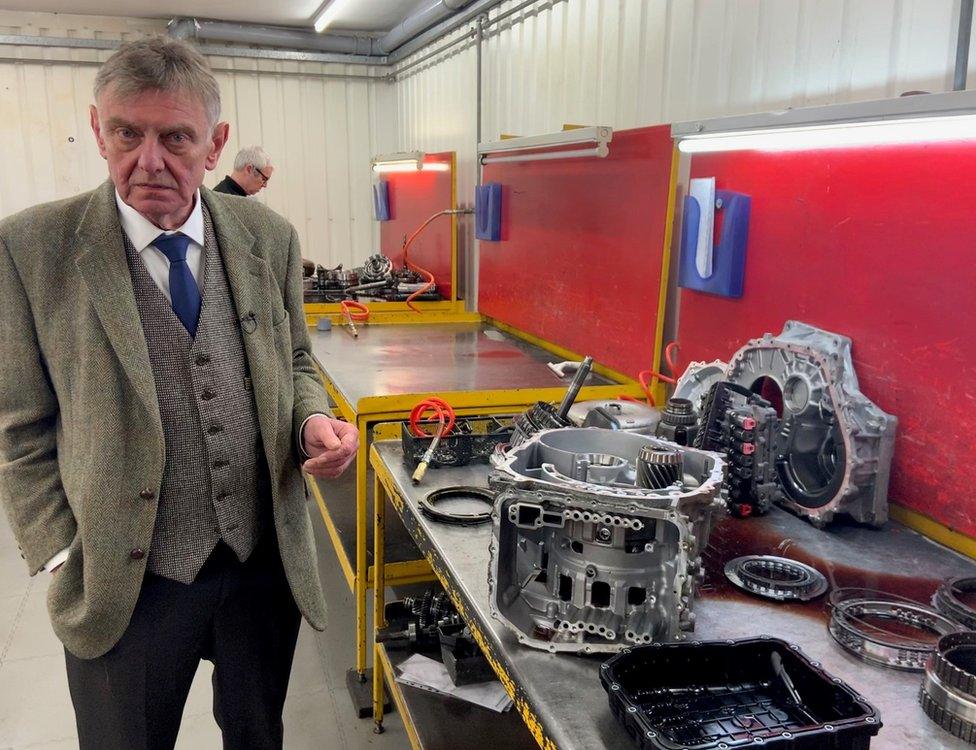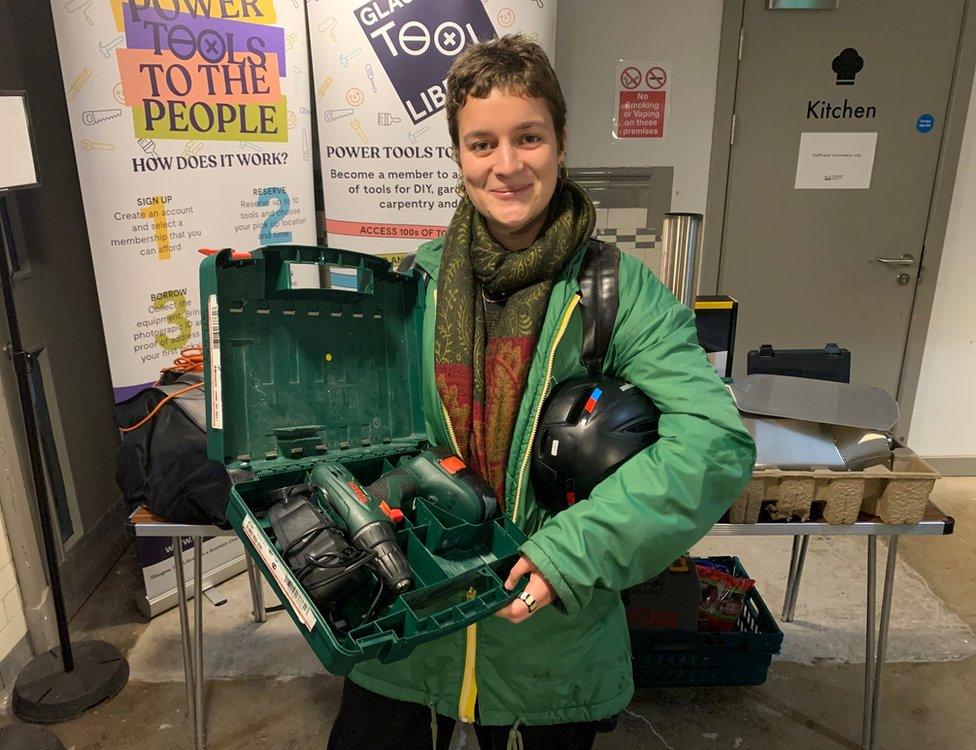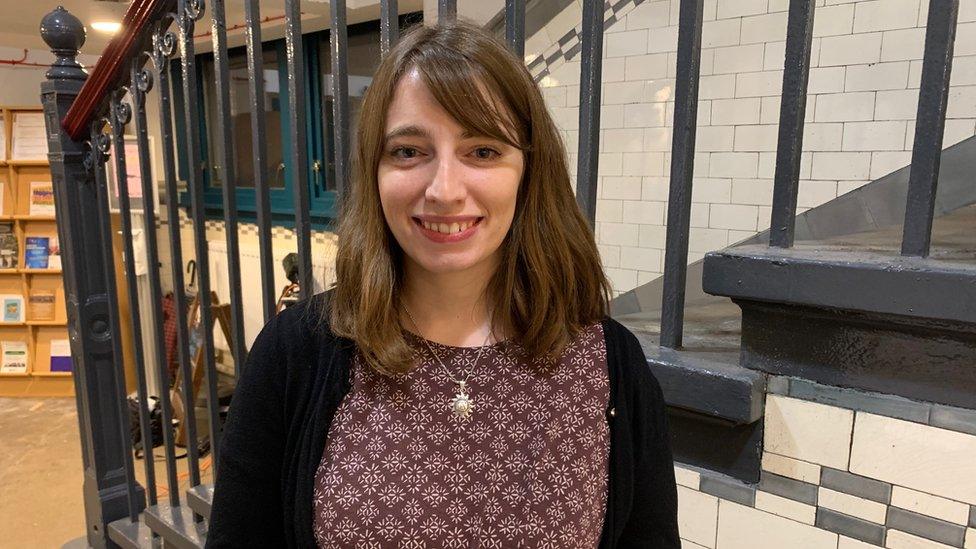Scots urged to make lifestyle changes to reduce waste
- Published

Lending libraries for items such as tools could cut down on resources
Scots are being urged to make fundamental lifestyle changes after a new study showed very few of the things they consume have been recycled or reused.
A new study commissioned by Zero Waste Scotland called for business models to shift away from selling to more leasing of goods - from cars and furniture to household appliances.
It also suggested shorter journeys for leisure and more home-working, while buying fewer clothes and keeping them longer.
For industry, the Scottish government agency proposes a fundamental re-think of the way products are designed in this country and around the world.
The Zero Waste Scotland report found Scots recycle or find a new use for only 1.3% of the resources that came into the economy in 2018. That includes raw materials and the energy used to produce and ship them.
The measure includes goods manufactured in other countries but sold and used in Scotland.
The global average for re-using resources and circulating them round a "circular economy" is six times higher than the Scottish figure.
While this calculation has only been used on a handful of countries, Scotland came out as having the least circular re-use of resources, even compared with similar European countries.

Making old gearboxes as good as new

John Mackie started the business 45 years ago
John Mackie started out as a car mechanic in Lanarkshire, replacing gear boxes when they broke.
But he realised that they could be mended at lower cost, so, as a young man, he set up his own company to do so.
Forty-five years ago, Mackie Transmission was driven by the incentive of manufacturers and owners to save money. It's now a flagship for Scotland's green economy.
When major manufacturers, such as Hyundai or Honda, find gearboxes failing during a car's warranty period, they send it to the workshop in east Glasgow, where it is thoroughly cleaned and stripped down.
With nearly 30 workers, and an average experience in the firm of more than 20 years, they are expert at identifying problems, re-tooling the equipment, testing it with their own bespoke equipment and sending it back to the manufacturer in better condition than it started.
They aim to save at least 60% on the cost of a new gearbox.
With some marques, the company is confident enough about its processes that it offers a longer warranty than the original manufacturer.
And it can boast that a new car with a Mackie re-manufactured gearbox is more reliable than one with a gearbox fresh off the assembly line.
What makes this more than just a repair shop is that the data collected by Mackie is extremely valuable to the manufacturers. Glasgow technicians know better than Hyundai's where the weak spots are in the Korean product.
So they advise manufacturers about how to improve their processes and that feeds into more reliable, longer-life cars.
To John Mackie, this is not about repair, recycling or re-use but about re-manufacturing - the difference being the testing of equipment to make sure it's at least as good as a new gearbox.

Lending not buying

Thalia Groucott was borrowing a drill to hang curtain rails
Scotland was once a took a world leader lead in public lending libraries for books.
It is now part of the move towards lending and leasing for many other items.
Major firms, such as John Lewis, are shifting from a conventional model of selling goods to offering services around goods, including the lease of clothes and furniture.
Cars are much more often leased than owned, and there has been growth in car clubs, for short-term rental.
The entertainment industry has made a major shift from selling products of CDs, DVDs and games to streaming and downloading services.
The lending library movement extends to children's toys, to avoid buying new at every stage of a child's development.
And in Glasgow's Kinning Park, there is one of an increasing network of tool libraries. Those who borrow avoid having to own every tool they need or might need, often for very rare use.
One of those borrowing a drill to hang curtain rails is Thalia Groucott, aged 22.
She explained she has recently moved into a new flat, and has borrowed drills a few times, sanders for furniture and "a pipe bender was probably the most exciting thing".
"A lot of it is quite specialist and expensive to buy," she said. "I've been doing these little DIY projects, but it's not something I'm doing all the time.
"I like that it's good for the environment, and I'm not having to buy something new all the time, that it doesn't take up space without much storage in my flat."
And as she works in the same building, it is a convenient place to drop things off and pick them up.

Emma Erwin has worked for the Share and Repair Network since the project began in March
Emma Erwin has worked for the Share and Repair Network since the project began in March.
She said: "Sharing libraries are much like book libraries, but for lending objects across Scotland - tools, music instruments, toys.
"They're great for the planet and for people. They mean people can borrow rather than buy, which massively reduces our consumption and environmental impact, reducing what gets discarded and goes to waste.
"They're good for people, in loads of ways - reducing the money they're spending on items, also helping them reduce their costs. Lots of sharing libraries are lending thermal imaging cameras, to help people make their homes more (energy) efficient.
"We've had someone with 26p in his bank account came to a sharing library to borrow tools for some gardening jobs, he then set up in business and he's now employing other people in landscape gardening."

What is a Circular Economy?
According to the Ellen MacArthur Foundation, which campaigns on re-use of resources: "In our current economy, we take materials from the Earth, make products from them, and eventually throw them away as waste - the process is linear. In a circular economy, by contrast, we stop waste being produced in the first place".
The Scottish government plans a Circular Economy Bill in 2023.
The initiatives already scheduled include extension of garden waste collection during 2023, and the deposit return scheme for single-use drinks containers. Ministers also plan to design better systems for collecting household waste.
In the following two years, there are plans for separate collection of textiles, a charge on all single use coffee and tea cups, and a ban on using landfill for bio-degradable waste.
Proposals for the Circular Economy Bill focus where legislation could make a difference include setting statutory targets for reducing waste and setting up a circular economy agency. It is proposed that businesses are required to publish their data on disposal of some materials and unsold stock.
It was suggested by the Scottish government that it could ban the destruction of unsold durable goods.
France has introduced such a ban on companies destroying clothes, cosmetics, hygiene products, electrical items and other unsold or returned items. Rather than landfill or incinerate unsold goods, companies have to reuse, donate or recycle their unsold products.
A further push in the legislation may be towards strengthening the responsibility on local councils to collect waste for recycling, and also on the public to use recycling bins as they are intended.

Carbon footprint
The Zero Waste Scotland study looks at several measures of Scotland's footprint on the environment.
One includes imports into Scotland and the resources used in making and shipping them. It excludes the impact of goods made in Scotland and exported to other countries.
That shows Scotland's use of resources totals 22 tonnes per head, while the worldwide average figure is 12 tonnes.
Another way of accounting for Scotland's resource use is its carbon footprint, including emissions from the manufacturing processes that lead to imported goods.
That comes to 14 tonnes of carbon dioxide per head in Scotland, compared with 5.5 tonnes globally.
The use of oil or gas across the economy is led by aviation, construction, making machinery as well as public services such as health and social care. It extends to the defence sector, hotels, restaurants and food processing.
Several options for going further and meeting the challenge on a bigger scale are put forward in the report, including:
A circular food system - in which there is less waste from buying too much, and waste food is processed for energy: less eating of meat, and more use of seasonal and local food production.
Circular manufacturing - in which goods use fewer raw materials, and are designed to be used for longer, to be dismantled and more easily mended, and given a new purpose or broken up for recycling.
The transport sector shifting to renewable energy in lighter vehicles: more car sharing, flexible home-working and fewer unnecessary journeys.
A more circular lifestyle would see people re-using, repairing, donating and recycling: reduced demand for home appliances, leasing instead of owning and using sharing libraries: more local travel and leisure, and reduced use of paper.
Buying goods made closer to home, while making domestic manufacturing more efficient.
Improved re-cycling and re-use of equipment reaching the end of its life, particularly in the offshore energy sector.
More effort to make homes energy efficient, re-using building materials and sourcing closer to home. Better use of buildings, with fewer vacancies and second homes.
The consultancy that drew up the report has calculated following such ideas could raise the extent of Scotland's circularity nine-fold, from 1.3% to 11.8% of resources.
Iain Gulland, at Zero Waste Scotland, concedes that 100% circular economy is not possible, and nor is it desirable, as the resources include essentials such as food and buildings. He declined to give a target for an ideal circular economy.
"Four-fifths of our overall carbon footprint comes from manufactured products, half of which are produced overseas," Mr Gulland said.
"So our dependency on these produced overseas, and not understanding the environmental impact, is part of the problem," he said.
"Basically everything we use has a carbon impact, so how can we think differently about it?
"How could we re-use more? How could we shop second hand, think about the clothing we own, think differently about products and services we're using and ultimately businesses have an opportunity to reshape their business models, to think about subscription models, leasing and renting rather than selling?"